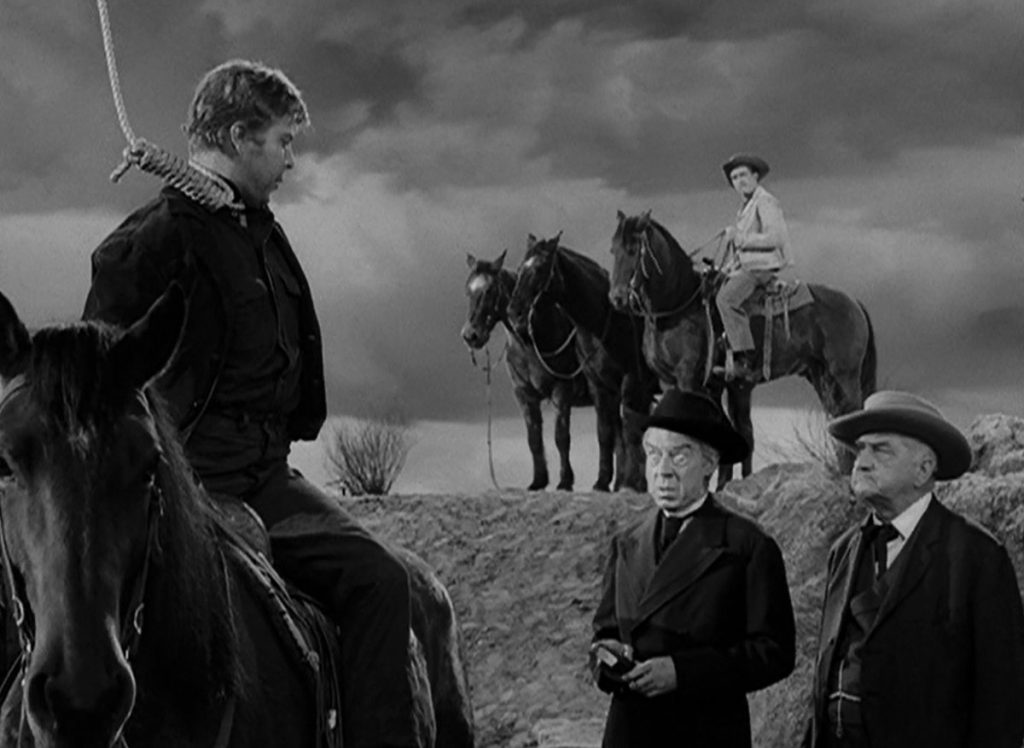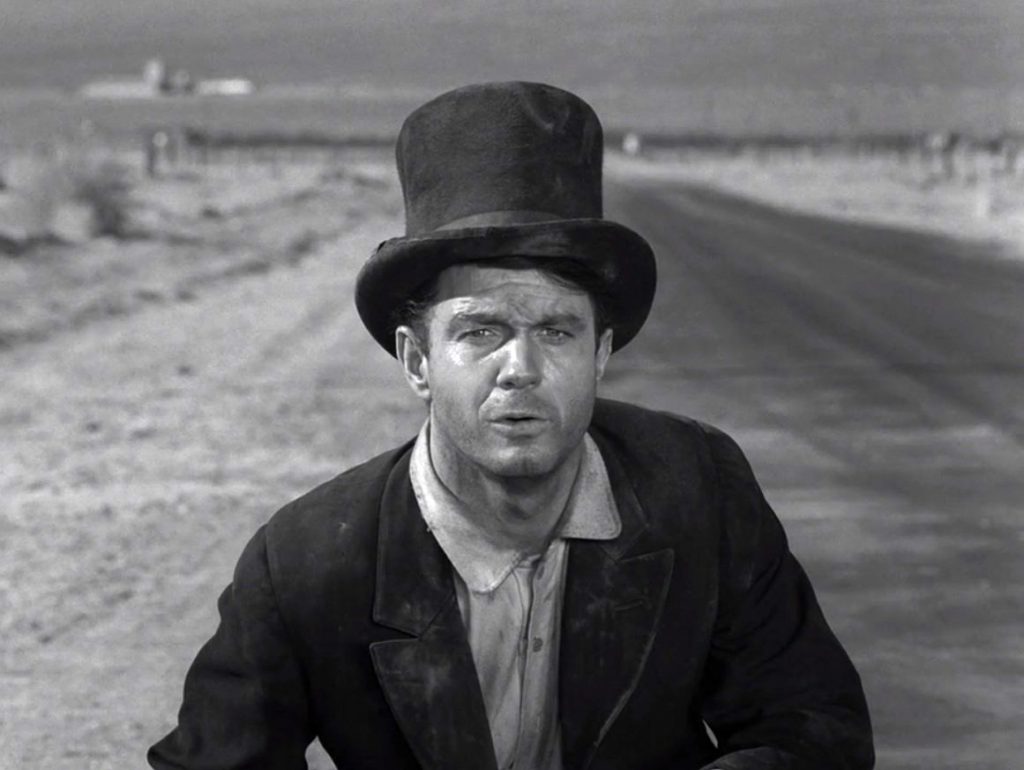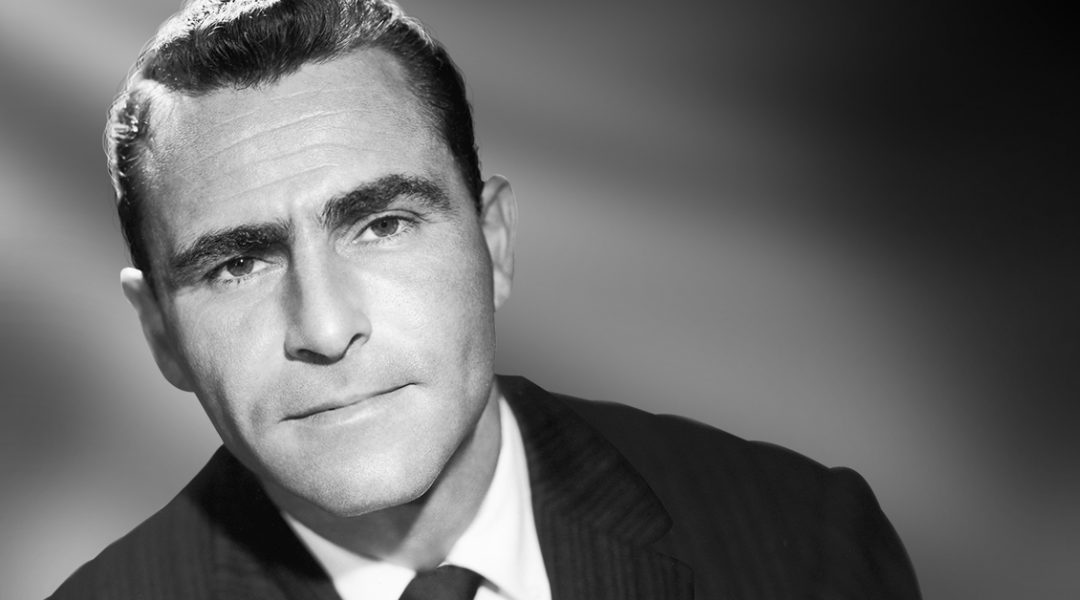Rod Serling often got his cowboy on in his 1959–64 TV series.
As creator, host, executive producer, and frequent scriptwriter of The Twilight Zone, the late, great Rod Serling invited television viewers to join him on a journey to “another dimension, a dimension not only of sight and sound but of mind.” And on more than one occasion, the boundaries of that alternative universe expanded westward, as Serling offered idiosyncratic western tales that were by turns spooky and satirical, chilling and cautionary.
With Halloween fast approaching, we thought it might be a good time to dip into the vault, so to speak, and take another look at seven classic western-themed Twilight Zone episodes — all of them scripted by Serling himself — that frequently air in syndicated reruns, and are available for streaming on Amazon Prime and other platforms.
“Mr. Denton on Doomsday”
Al Denton (Dan Duryea) used to be somebody — a notorious gunslinger — until he devolved into a drunken nobody. He appears bound for a one-way trip to Boot Hill when he’s egged into a showdown with a sadistic bully (Martin Landau) until fate — or, to be more specific, a mysterious character named Henry J. Fate (Malcolm Atterbury) — enters into the picture. The good news: Denton magically regains his fast draw. The bad news: This mixed-blessing miracle means Denton must again face challenges from glory-seeking young guns like the one played by Doug McClure (three years before he began his run in The Virginian.) The worse news: Fate doesn’t always play favorites. (Twilight Zone Season 1, Episode 3)
“Execution”
Modern-day scientist George Manion (Russell Johnson — aka “The Professor” from Gilligan’s Island) tests his new time machine by randomly snatching someone, anyone, out of the past. Unfortunately, Manion inadvertently transports outlaw Joe Caswell (Albert Salmi) from 1880 just moments before the scoundrel was to be hanged for murder. The scientist quickly realizes he has made a big mistake. Not surprisingly, however, Caswell will stop at nothing to keep from returning to the necktie party where he was guest of honor. (Twilight Zone Season 1, Episode 26)

“Dust”
Another hanging is interrupted by fantastical means in this classic episode about a lifesaving event in a dying town. On the day that his son is slated to be executed for accidentally causing a young girl’s death while drunk, a desperate father (Vladimir Sokoloff) falls for the spiel of a scurvy peddler (Thomas Gomez) who sells him “magic dust” that will sway the vengeful townspeople to change their minds about enforcing the death sentence. The dust, of course, is nothing more than everyday dirt. And the father finds, much to his dismay, that it doesn’t have the desired effect on the townspeople. But there’s more than one way for a condemned man to make a return trip from the gallows. (Twilight Zone Season 2, Episode 12)
“A Hundred Yards Over the Rim”
In another classic Twilight Zone episode, Cliff Robertson gives an exceptionally compelling performance as Christian Horn, leader of an 1847 California-bound wagon train who has an adventure more bizarre than any experienced by Ward Bond or Sam Elliott on their westward journeys. When his son falls ill during their long trek through the desert, and his fellow travelers consider turning back because water and food supplies are running out, Horn goes ahead alone to scout the territory — and miraculously winds up in a then-contemporary (i.e., 1961) New Mexico diner. Like many fictional time-travelers, Horn discovers the future will be critically affected by actions taken in his own time — but only if he can make a return trip, Sterling narrates, “after a brief detour through the Twilight Zone.” (Twilight Zone Season 2, Episode 23)

“The Passersby”
At the end of the Civil War, a wounded Confederate sergeant (James Gregory) travels by foot, with the aid of a crutch, on a long road that brings him by the fired-ravaged mansion of Lavinia Godwin (Joanne Linville), who thinks her husband Jud, a Confederate officer, has been killed in battle. The longer the sergeant and Lavinia converse, the more they notice more soldiers, both Union and Confederate, trudging down the road. They’re amazed when Jud (Warren Kemmerling) appears as one of the weary travelers. And they’re astounded when they realize they have something in common with him and the other men on their way to meet their fate. (Twilight Zone Season 3, Episode 4)
“Still Valley”
Another Civil War story. In 1863, a Confederate Army scout named Paradine (Gary Merrill) encounters a bizarre phenomenon in a valley filled with Union Soldiers who have been frozen in time. It doesn’t take long for him to discover there’s a supernatural explanation: An old man (Vaughn Taylor) cast a spell from his ancient book of black magic to halt the invaders in their tracks. Paradine accepts the book as a gift from the geezer, who is not long for this world, and plans to turn the tide of the Civil War by freezing the entire Union Army. Before he does, however, Paradine learns what so many other characters learned in Twilight Zone tales: Sometimes, the devil really is in the details. (Twilight Zone Season 3, Episode 11)
“Showdown With Rance McGrew”
And now for something completely different: A slyly satirical comedy tweaking some of the prime-time westerns that were so popular in the 1950s and ’60s. Egocentric actor Rance McGrew (Larry Blyden) rides tall as the star of a TV series in which his character routinely defeats legendary Wild West outlaws. But he’s yanked out of his comfort zone when he’s transported to the past by none other than Jesse James (Arch Johnson), who demands a more realistic depiction of desperadoes on Rance’s show. As Serling sums up in his closing remarks: “The evolution of the so-called ‘adult’ western, and the metamorphosis of one Rance McGrew, formerly phony-baloney, now upright citizen with a preoccupation with all things involving tradition, truth, and cowpoke predecessors. It’s the way the cookie crumbles and the six-gun shoots — in The Twilight Zone.” (Twilight Zone Season 3, Episode 20)
Postscript: A year after The Twilight Zone concluded its five-season run on CBS, Rod Serling returned to the network with The Loner (1965–66), a more traditional TV western starring Lloyd Bridges as William Colton, a former Union cavalry captain who roamed the frontier during the post-Civil War era. Reviews were mostly favorable, but ratings remained anemic, and the series wound up lasting only a single season. Still, The Loner (one of the last half-hour TV westerns shot in black-and-white) is remembered fondly by many viewers who appreciated Serling's handiwork as writer of more than half the 26 produced episodes.
Submitted for your approval: “Westward the Shoemaker,” an episode first telecast on November 27, 1965, in which Colton comes to the aid of a Latvian emigre (David Opatoshu) whose dreams of owning his own shop are nearly dashed by a dastardly gambler (Warren Stevens).














